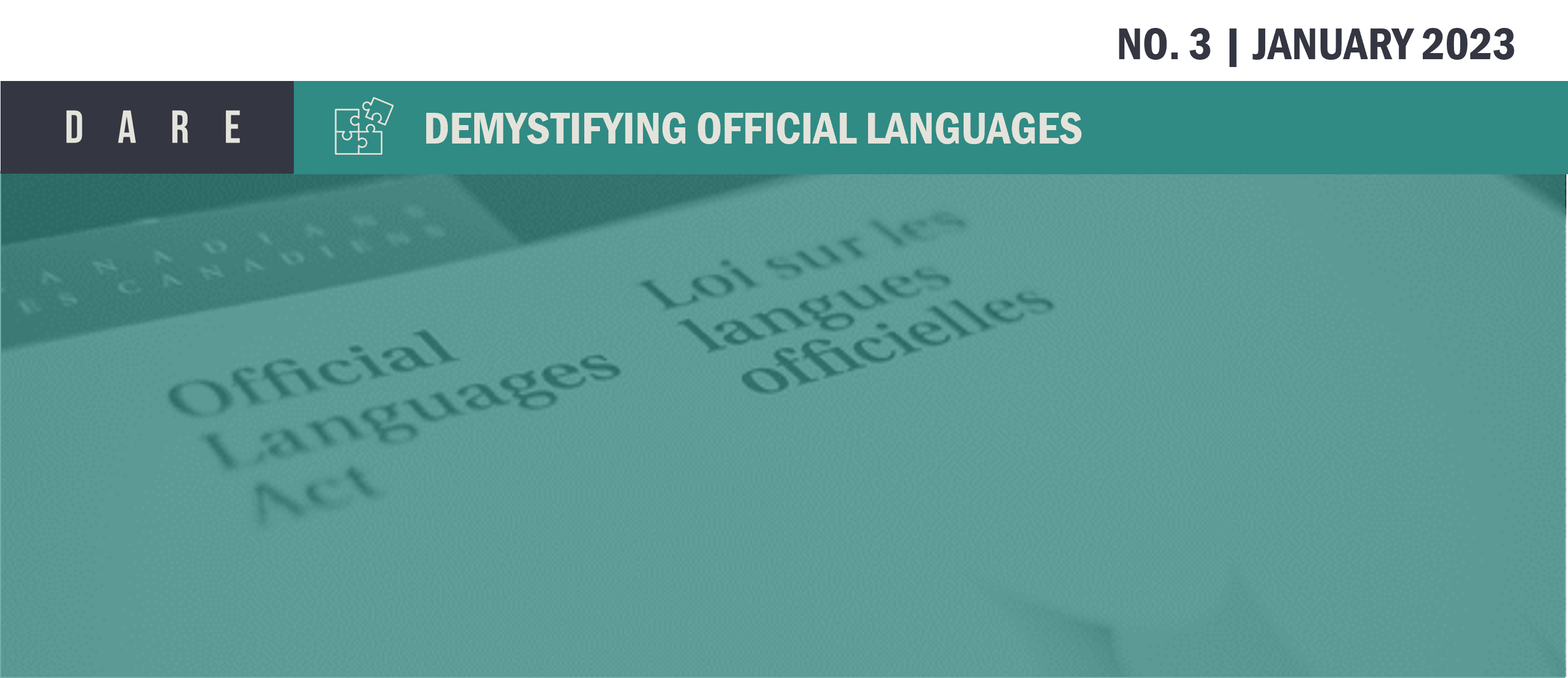Important: The GCConnex decommission will not affect GCCollab or GCWiki. Thank you and happy collaborating!
CNOLC-newsletter-no3/demystifying
DEMYSTIFYING OFFICIAL LANGUAGES
The purpose of this vignette is to clarify and explain certain concepts, articles, mechanisms and roles related to official languages.
In this issue, we provide an overview of the key elements of the Council’s 2023–2026 Strategic Plan: Acting for Change.
ABOUT THE COUNCIL
First, the Council is a horizontal organization of the Government of Canada in which departments, agencies, Crown corporations and regional federal councils work together. The 25-member body provides a voice for the 215 champions across the federal public service, serves as an agent of influence and mobilization, and promotes common approaches. It is led by two co-chairs, who act as official languages champions in their respective organizations, and it is supported by a national coordinator.
REVIEW OF THE 2018–2021 STRATEGIC PLAN
The 2018–2021 Strategic Plan expired on March 31. Despite the challenges caused by the pandemic, all key activities were completed, including the following:
- An awareness campaign for leaders on the importance of setting the tone for official languages;
- The launch of the Dare newsletter, a biannual publication for official languages champions;
- Work in collaboration with the Translation Bureau to identify initiatives by all federal institutions on a single page: the Official Languages Hub®;
- A new Official Languages Champions’ Toolbox that contains over 200 tools and resources, including a Reference Guide for champions, and infographics about the Council and the role and responsibilities of champions;
- Organizing events with an average of 10 times more participants: Official Languages Day and the Best Practices Forum on Official Languages;
- Better regional representation on the Council and greater consideration of official languages issues across the country.
KEY ELEMENTS OF THE STRATEGIC PLAN
Incorporated into the proposed new vision are inclusiveness and greater scope across the country for key partners:
- To be a key partner in promoting official languages in the public service and celebrating diversity, inclusion and the use of English and French across Canada.
- Act as an agent of influence for official languages within the Government of Canada and mobilize deputy heads and official languages champions to promote common approaches and ensure that official languages are a top-of-mind issue at the senior management level.
BEYOND THE PROMOTION ROLE
The main measure proposed is to encourage official languages champions to act as agents of change by exercising a more strategic and tactical role. In consultation with its partners, the Council will propose common approaches and opportunities for champions to go beyond their promotion functions and fully exercise their role by suggesting elements for their institution’s official languages program, if their situation permits. Through their role in their organization’s executive committee and official languages committee, champions are in a unique position to make a special contribution to the advancement of the official languages program during this pivotal time by demonstrating leadership and influence. To that end, we have identified a few key activities:
- Enhancing champions’ leadership role in times of emergency by ensuring that an official languages lens is applied, particularly in communications;
- Encouraging champions to lay the groundwork for the implementation of the new Official Languages Act;
- Encouraging champions to ensure implementation of the recommendations of the Public Service Employee Survey Working Group and the Treasury Board of Canada Secretariat’s second-language training framework;
- Identifying the converging points between official languages, Indigenous languages, and diversity and inclusion, and providing materials so that champions are better equipped to address these issues.
STRENGTHENING THE COUNCIL’S ROLE AS A MOBILIZER
Mobilizing the official languages champion community to advance the official languages program is central to the Council’s mandate. To that end, we have identified four key activities:
- Support efforts to modernize the Official Languages Act;
- Promote the designation of Official Languages Day so that the event is celebrated throughout Canadian society;
- Keep champions informed through the Dare newsletter;
- Promote the best practices of federal institutions by listing them in the Official Languages Hub®.
SUPPORTING THE CHAMPIONS
One of the Council’s important roles is to provide support and tools for the 215 official languages champions across the public service so that they are able to support their deputy heads. Concrete measures have been planned to achieve this:
- Develop online training to complement the information sessions for new champions;
- Provide support to ensure a smooth transition between champions;
- Keep champions informed through the Dare newsletter;
- Promote the best practices of federal institutions by listing them in the Official Languages Hub®.
WORKING IN PARTNERSHIP
The Council has few resources, and its capacity to act depends on cooperation. It plans to strengthen relationships with existing partners and identify new partnership opportunities. Key activities include the following:
- Setting up and maintaining partnerships with key organizations in the federal government and with community stakeholders such as the Linguistic Duality Network, composed of Canadian Parents for French, French for the Future and the Dialogue Foundation;
- Exploring new partnerships with stakeholders responsible for Indigenous and other languages spoken in Canada, including sign languages;
- Chairing and participating in various committees, working groups and networks such as the annual events organizing committee, the Working Group on the Public Service Employee Survey and the Committee of Assistant Deputy Ministers on Official Languages (CADMOL);
- Organizing conferences in official language minority communities.
ACTING FOR CHANGE
This is an ambitious plan, but the Council believes it has the capacity and partnerships to achieve these strategic objectives and implement key activities. Now is the time to act for change!




